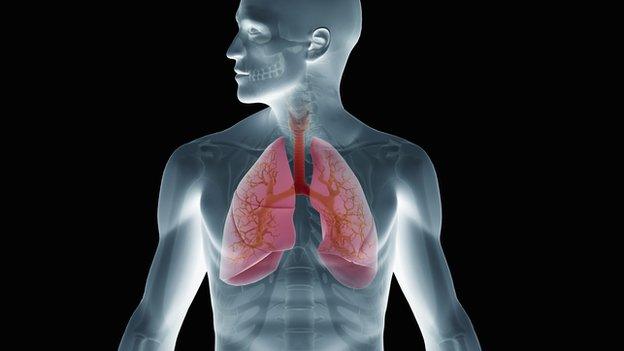Does cancer get too much attention?
- Published

Idiopathic pulmonary fibrosis is a little known, but deadly, lung disease
Over recent years, new institutions, targets, campaigns, and funding have steadily helped drive improvements in cancer care, treatment and survival.
However, in this week's Scrubbing Up, respiratory consultant Dr Toby Maher of the British Lung Foundation argues that while efforts by the Government, NHS and other healthcare bodies to fight cancer are welcome, other diseases with similar rates of incidence and mortality should be given the same priority.
Great efforts have rightly been made to improve cancer diagnosis, treatment and support in recent years.
Last month the government announced an extra £160m for the Cancer Drugs Fund, which covers the cost of expensive cancer treatments. This is in addition to the £400m package announced last year.
Over £4bn has been invested in cancer research in the last 12 years, while multi-million pound awareness campaigns, such as 'Be Clear on Cancer', have helped improve public awareness and early diagnosis.
The National Cancer Intelligence Network, now a part of Public Health England, has been set up to drive improvements in care standards and clinical outcomes. Cancer also has its own Strategic Clinical Network within NHS England, to co-ordinate improvements in care.
So far, so good.
'Every bit as devastating'
Cancer is a horrible group of diseases. The UK still lags behind Europe and the US in many aspects of cancer care, so it is absolutely right that we do what we can to tackle it.
However, is it fair that the kind of efforts mentioned above are not being made for other diseases?
Especially when many other medical conditions have survival rates worse than a lot of cancers.
Take, for example, one of my main areas of work, idiopathic pulmonary fibrosis (IPF) - a dreadful disease that causes progressive scarring in the lungs, making it increasingly difficult to breathe.
The number of people with IPF in the UK is increasing by around 5% a year; today it kills more people each year (around 5,000) than leukaemia.
It often progresses with devastating speed, with half of IPF patients dying, usually of respiratory failure, within three years of diagnosis.
To the terminally ill patients I have met, and the grieving loved ones they have left behind, IPF is every bit as devastating as any cancer.
Yet, despite this, IPF receives nothing like the same level of prioritisation as cancers of comparable mortality, like leukaemia.
Delayed diagnosis
The government invested only £600,000 in IPF research last year - leukaemia research received over £32m from all sources.
Awareness is also far lower: most of you will have heard of leukaemia, but many even within the medical community have never heard of IPF.
Unlike for cancer, there are an inherent lack of integrated services, no Strategic Clinical Network for respiratory diseases, and currently no approved quality standards.
An "urgent" referral for an IPF patient can take months - for cancer, the vast majority are seen within two weeks.
As a result, IPF patients often endure delayed diagnosis, inconsistent care, limited or inadequate information concerning their disease, limited treatment options and a lack of end-of-life palliative care.
Added to this we still don't even know what causes IPF, let alone how to cure the condition.
Heads nodding

Dr Maher says patients with other conditions want the same focus
Ultimately, this is costing lives. While mortality rates for leukaemia have fallen by almost a fifth over the last 40 years, they have increased six-fold for IPF.
Though shocking, I therefore understand when IPF patients tell me that they wish they had cancer instead.
And while IPF may be one of the most significantly neglected diseases, it is by no means alone.
I'm sure many other medical professionals will be nodding their head at this article, asking too why their disease area does not receive the same level of prioritisation as cancer, despite having similar incidence, progression and morality rates.
Of course cancer is horrible, and it is right that we do what we can to tackle it.
However, to the thousands of patients and loved ones living with equally devastating diseases, it does seem unfair that their condition isn't receiving the same level of prioritisation, just because its name does not contain the dreaded C-word.
The focus of government, the NHS and other healthcare bodies should be to help ill people live longer, happier, healthier lives.
The name of the disease which happens to be causing a person's illness should not be the factor which determines their standard of care.